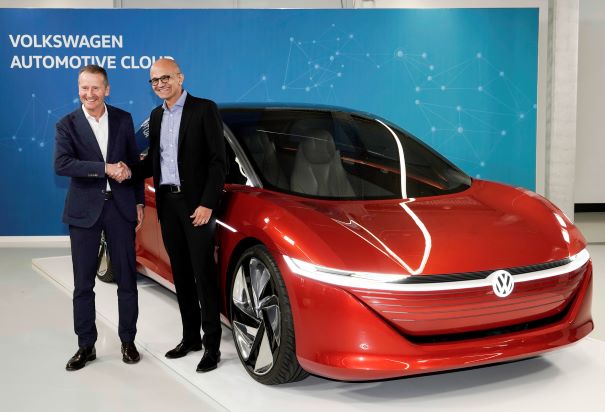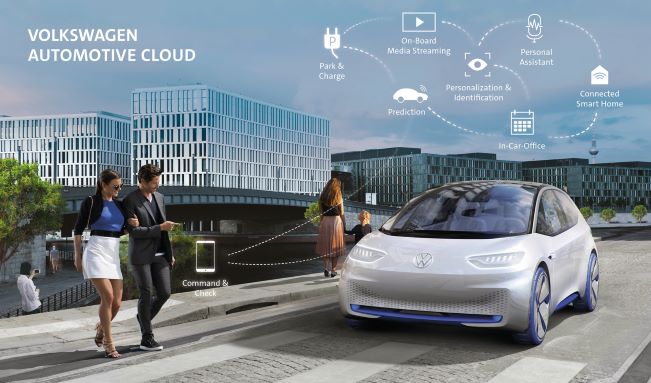

Auto and Technology magnets come together
Necessity can bring out unlikely partnerships. This seems to have happened for the German Cargiant Volkswagen and Tech giant Microsoft who joined hands in October last year and now are expanding their services to the upcoming EV markets.
“Our strategic partnership with Microsoft is a key element in our efforts to develop Volkswagen into a software-driven mobility provider. With the Volkswagen Automotive Cloud, we are working on a unique solution for our customers. Our upscaling capabilities give us a huge competitive advantage in this area,” said Dr. Herbert Diess, CEO of Volkswagen AG.
Digital transformation of the automotive and IT industries
The company since the beginning of the year has announced that it has planned €34 billion (~Rs 2.75 Trillion) up to the end of 2022 for e-mobility, autonomous driving, digital connectivity and new mobility services. Then again in January, it confirmed an investment of €870 million (~Rs 7055 crore) by 2020 for producing e-vehicle components, including battery cells as well as recycling of old cells. With all the investments heading for electric mobility, Microsoft will extend Volkswagen Automotive Cloud into further regions of the world including Europe, China and the USA – the core markets for the future full-electric, fully connected ID. model family.


Volkswagen and Microsoft are also working together on first lighthouse projects for connected vehicle services. Both companies want to deliver communication and navigation solutions as well as personalized services. These will leverage self-learning algorithms facilitating the use of services in the vehicle and offer occupants many extended functions.
[related_post]
“Digital technology is rapidly changing every aspect of the auto industry – from the manufacturing process to the car itself,” said Satya Nadella, CEO of Microsoft. “Our partnership will enable Volkswagen to deliver new Azure-based connected vehicle services that accelerate the company’s transformation into a software-driven mobility provider and define the future of mobility for people everywhere.”
The agreement is part of Volkswagen’s effort to offer connected vehicle services across the globe. Vehicles will be able to tap into Microsoft’s remote computer processors via the cloud, which means Volkswagen can offer its customers a personalized onboard media streaming service, as well, make suggestions for parking and locate charging stations. Volkswagen said it will use its Automotive Cloud for its new ID electric cars, which are due to hit showrooms in 2020.
The partnership will tie all the ends for the Volkswagen dream to hold the pole position in the electric vehicle segment. Volkswagen already has the capability of producing up to 50 million electric vehicles over the years through its newly built electric car facilities including ones in China. Volkswagen estimates that it must sell 600,000 more electric vehicles per year to meet the drastic new CO2 emissions goals released by the European Union. This is one of the reasons it had focussed its energies on entry level electric cars under the banner of VW ID. Family to make electric cars available for everyone.
Reliance Industries Ltd (RIL) Chairman Mukesh Ambani has announced a massive ₹75,000 crore investment in…
Green-energy heavy-duty truck maker Blue Energy Motors has reached a remarkable milestone by surpassing 50…
India is on track to exceed its Nationally Determined Contribution (NDC) target of reducing the…
Raj Process Equipments and Systems Pvt Ltd, a Pune-based technology innovator and engineering conglomerate, is…
Europe’s renewable energy sector faces a potential slowdown, burdened by grid saturation, permitting delays, and…
Hexa Climate has announced the launch of a pioneering afforestation project in Purulia, West Bengal.…